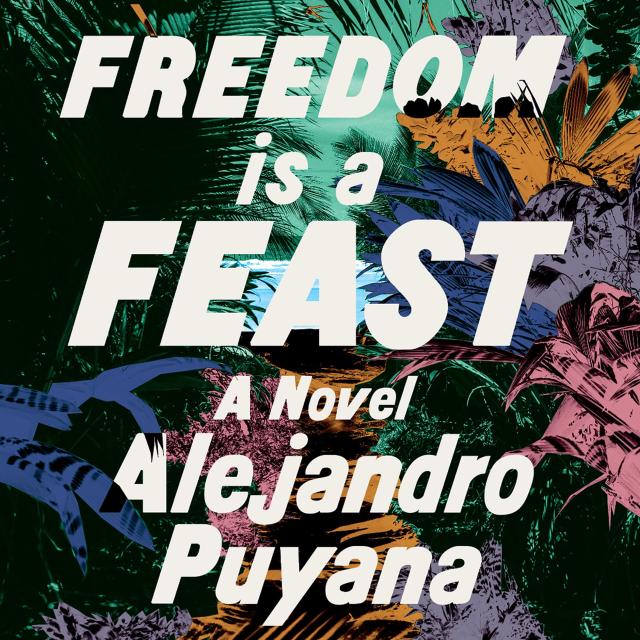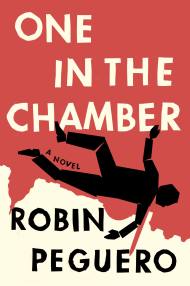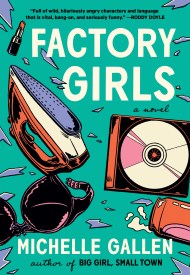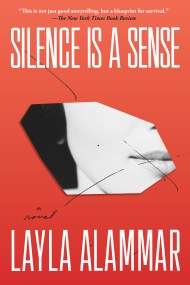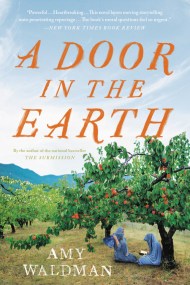Freedom Is a Feast
Contributors
Read by Luis Selgas
Read by Blas Kisic
Read by Graciela Valderrama
Read by Ana Osorio
Formats and Prices
Price
$31.99Format
Format:
- Audiobook Download (Unabridged) $31.99
- ebook $14.99 $19.99 CAD
- Hardcover $30.00 $39.00 CAD
Also available from:
A multigenerational, Latin American saga of love and revolution in which a rebel who commits a youthful betrayal receives a late-life chance at redemption and a new life: “a tour de force” from “the new master” (Luis Alberto Urrea, New York Times bestselling author of Good Night, Irene).
In 1964, Stanislavo, a zealous young man devoted to his ideals, turns his back on his privilege to join the leftist movement in the jungles of Venezuela. There, as he trains, he meets Emiliana, a nurse and fellow revolutionary. Though their intense connection seems to be love at first sight, their romance is upended by a decision with consequences that will echo down through the generations.
Almost forty years later, in a poor barrio of Caracas, María, a single mother, ekes out a precarious existence as a housekeeper, pouring her love into Eloy, her young son. Her devotion will not be enough, however, to keep them from disaster. On the eve of the attempted coup against President Chávez, Eloy is wounded by a stray bullet, fracturing her world. Amid the chaos at the hospital, María encounters Stanislavo, now a newspaper editor. Even as the country itself is convulsed by waves of unrest, this twist of fate forces a belated reckoning for Stanislavo, who may yet earn a chance to atone for old missteps before it’s too late.
With its epic scope, gripping narrative, and unflinching intimacy, Freedom Is a Feast announces a major new talent. Alejandro Puyana has delivered a wise and moving debut about sticking to one’s beliefs at the expense of pain and chaos, about the way others can suffer for our misdeeds even when we have the best of intentions, and about the possibility for redemption when love persists across time.
-
“Epic doesn’t begin to describe this extraordinary novel. Freedom Is a Feast is as vivid and wondrous as your best dream, as unsettling and unforgettable as your worst. They say you can’t fit the entire world into a novel, but Puyana comes close. What a gift he has given readers, what a profound, shattering, inspiring gift.”Junot Díaz, Pulitzer Prize–winning and New York Times bestselling author of The Brief Wondrous Life of Oscar Wao and This Is How You Lose Her
-
“ 'Born storyteller' gets thrown around too easily, but how else would we believe that this is a debut? Freedom Is a Feast is fearlessly ambitious, dizzyingly complex, gorgeously written, and chock full of magic, sin, loss, and enduring love. A novel like this comes with fantastic precedent—García Márquez, Allende—but seems to have arrived fully formed, all by its dazzling self.”Marlon James, Booker Prize–winning and New York Times bestselling author of A Brief History of Seven Killings and Black Leopard, Red Wolf
-
“Freedom Is a Feast is a rare and explosive novel about the lengths to which the human heart will go for what is just and what is right. Alejandro Puyana announces himself as a major new talent with this unflinching debut of love, revolution, and family.”Kali Fajardo-Anstine, National Book Award finalist for Sabrina & Corina
-
“Spanning some fifty years and populated with unforgettable characters, Freedom Is a Feast is a debut of tremendous scope and gravity. Alejandro Puyana writes brilliantly about the ceaseless human quest to make a better world.”Laura van den Berg, author of State of Paradise
-
“Heart-stopping, heartbreaking, expansive, riveting: Alejandro Puyana’s Freedom Is a Feast is an astonishing first novel by a writer capable of showing the sweep of history and the souls of his characters at the same time.”Elizabeth McCracken, National Book Award finalist and author of Bowlaway
-
“In this vivid and arresting novel lives are lived in triage. A man is ‘a sheathed knife,’ and people are ‘bargaining chips’ during the dangerous reign of Hugo Chávez. Stories of humanity and even love shine through brutality, while lives change—or end—in an instant. Citizens are faced with impossible choices in the quest for freedom, and the need to honor their culture. Freedom Is a Feast is a memorable debut, and Puyana is already a master storyteller.”Amy Hempel, author of Reasons to Live and The Collected Stories
-
“Alejandro Puyana’s debut novel, Freedom Is a Feast, sneaks up on you, ensnares you, then explodes around you. It is a tour de force. Applause for the new master.”Luis Alberto Urrea, New York Times bestselling author of Good Night, Irene and The House of Broken Angels
-
“Freedom Is a Feast is a searing and soaring novel, a book that lays bare the costs of tyranny and the heart-rending sacrifices of those who dare to fight against it. By rendering the lives of characters from his native Venezuela with such clear-eyed compassion, Alejandro Puyana has given readers an extraordinary window into the soul of a nation. Freedom Is a Feast is the perfect novel for this political moment—a story of anger and loss, of courage and hope, and, with luck, of change.”Bret Anthony Johnston, author of the national bestseller Remember Me Like This
-
"Propulsive, pulse-quickening . . . Cinematic settings, evolving characters, and an explosive plot support a story of love and politics."Kirkus Reviews
- On Sale
- Aug 20, 2024
- Publisher
- Hachette Audio
- ISBN-13
- 9781668641408
“Puyana . . . squeezes adventure, even dark comedy, from misery and horror . . . It’s a Latin American tradition, a coping mechanism turned vocation for authors from Roberto Bolaño to Mariana Enríquez.” – The New York Times
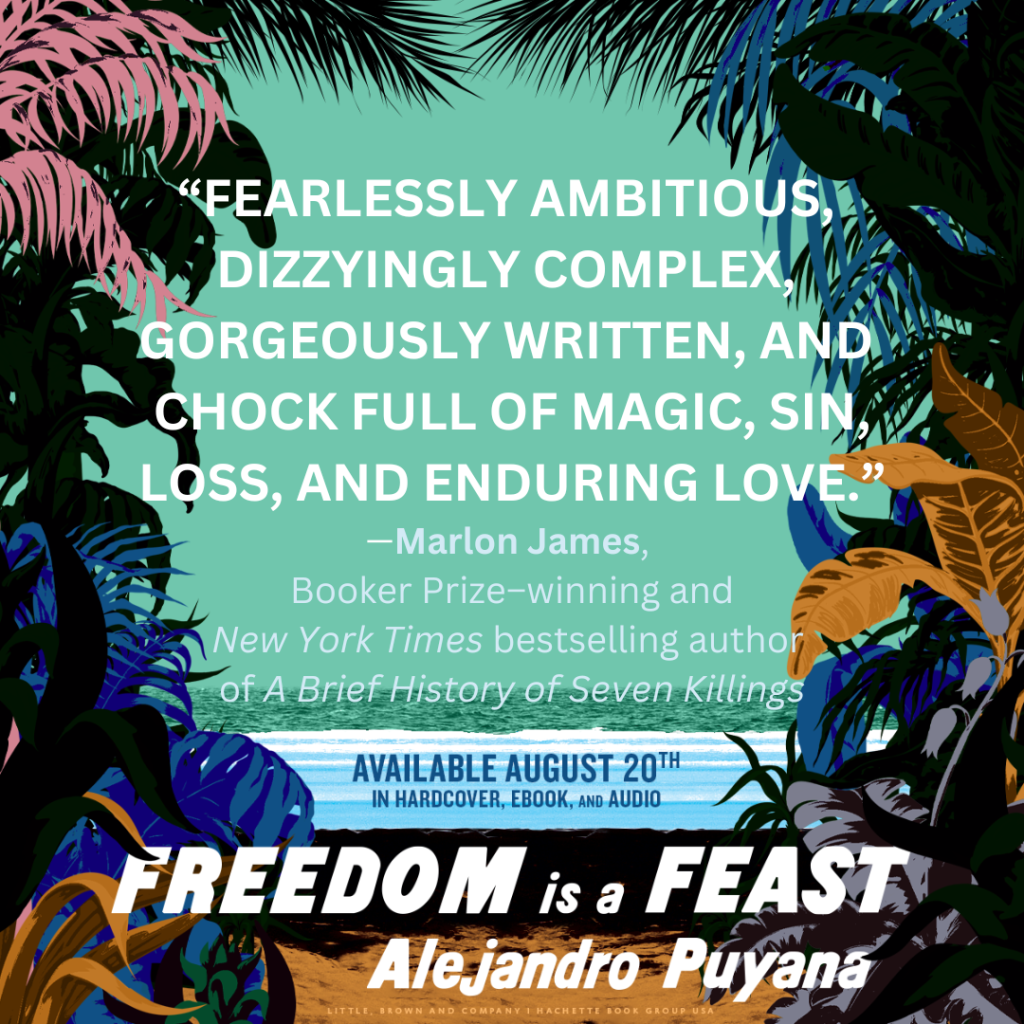
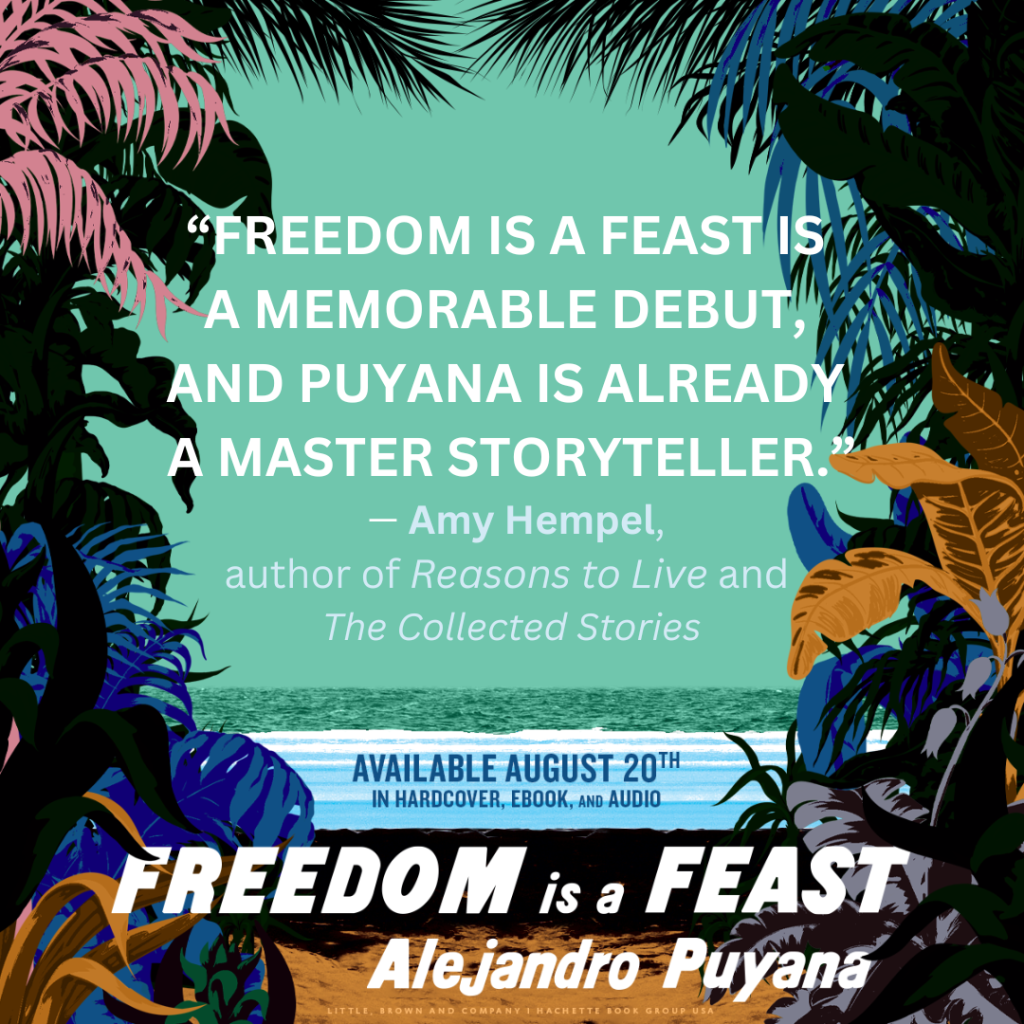

What's Inside
PROLOGUE
2002
On a normal day María would have walked to the open window, and from the clothesline just beyond it she would have unclipped the dress: cotton, pink, knee-length, with a lacy white apron that began the day clean and accumulated stains as she cooked for the Romeros. She had two other dresses just like it, one mint-green and one baby-blue, all of them given to her by La Señora when María had started cleaning at Casa Verde four years ago. The bad year. The year her mother died. After taking the dress from the line she would have folded it and packed it in her workbag with a bar of Savoy chocolate for a midmorning snack. But La Señora had called the night before, asking her to stay home. They were going to wait and see what happened with the opposition march first, she said. Señor Romero had heard things were going to get rough.
María woke up at her regular hour nevertheless, the lazy light just crawling over the mountain, stretching thin on the zinc roofs of Barrio Cotiza. She had lived in the barrios on the west side of Caracas ever since she could remember. First in an apartment building in Catia — when her mom still lived with family — working-class but sturdy, made of concrete and iron, with an elevator that wended its way up to the fifth floor shakily and slowly, and a bus stop right outside the building. When her mom started cleaning at an office building, they’d moved up the mountain, to a rented room that was a five-minute walk from the street through sets of concrete steps. Then, when María was a teenager, they made another move — farther up the mountain and down the poverty line — to their first rancho, no more sturdy walls, no more dependable utilities. Her mom was both disappointed and relieved when María insisted she needed to work, that school could be something she thought about later. Finally, they got here, to the highest part of Cotiza, her mother already sick by then, María’s son, Eloy, already a boy without a father. The burden of work sat heavily, and solely, on María’s shoulders. There was no more barrio above them, only mountain, and in this city none but the poorest lived this high up.
She brushed her teeth and checked on little Eloy, sleeping on the couch wrapped in Disney sheets — hand-me-downs from the Romeros.
At noon she was still home. That never happened except when the Romeros took their vacations: summer visits to Miami, Christmases in Whistler. But she was thankful not to travel across Caracas to Casa Verde today. The protests had been making public transit impossible. Fewer than half the buses were operating, they all charged more, even if it was against the law, and you had to fight your way on. With schools closed for days, figuring out how to keep nine-year-old Eloy occupied while still getting to work had been taxing — for her; for Magali, her best friend; even for her neighbor Jacinto.
But it felt wrong to be still. On weekdays the only people who weren’t up before the sun and on their way to work were drunks and criminals. Even though La Señora herself had asked her not to come, María couldn’t help feeling she was disappointing someone: her dead mother? herself? her son? She wasn’t sure.
She crossed the tiny living room of the rancho, winking at Eloy, who was lazing on the couch, and walked past her folding table covered in flowered contact paper to the kitchen at the far wall. Her two-burner countertop stove and her small fridge had grown patches of rust, and sported numerous dimples and bumps. Her concrete floor had cost her a year’s savings to install, and she was proud of it. On the wall to her right, the only one made of brick (the others were corrugated zinc paneling), one door led to the bathroom and the other to the sole bedroom in the house.
She opened her last bag of Harina P.A.N., a quarter full. She would have to figure out how to make it last, since she most likely wouldn’t have another for days, maybe weeks. The stores had been out of stock for a while now (though you wouldn’t know it from the pantry at Casa Verde, where María stacked the bright yellow bags one atop the other, like bricks in a wall). There were countrywide shortages of basic goods, including arepa flour, sugar, coffee, rice, even pasta. She made the arepas smaller than usual, leaving some flour for tomorrow, and placed the disklike corn cakes in a black skillet. While the arepas cooked she walked to Eloy, who lay reading a book, a blanket with a Donald Duck pattern wrapped around his skinny legs.
“It’s almost ready,” she whispered in her son’s ear and stroked his hair. When she kissed him, Eloy rolled and nuzzled his face into the cushions.
María went back to the kitchen and considered turning on the news. She had been avoiding it, knowing it would be more coverage of the march, more news about people hating Hugo Chávez or people loving Hugo Chávez. Why Chávez was the worst thing ever to happen to Venezuela, why Chávez was the savior of the people and the only way to Bolívar’s promise. Her own mind was a mess of contradictions, of memories of her mother and her devotion to the president, of her own feelings about him. On one hand, she liked him, the way he spoke to her and to her struggle in a way no other politician ever had. The way he looked: a strong, handsome man — but not in the way TV told her a handsome man should look. How could she not have fallen in love with Chávez, seeing him through her mother’s eyes? Seeing bits of Eloy in him — someone in power who looked like her son, his brown features devoid of European influence — made her feel good, gave her hope that her son could become someone important too. But Chávez also loved a fight, pitted people against one another. Four years since his election, and even though the magic of that day had not left her — it never would — he was starting to feel like just another politician. She wondered if her mom would feel similarly. The answer was no. She’d be out there with her red shirt and her beret, marching and carrying signs. Maybe she would have been able to prevent the thought of Chávez from turning rancid in María’s mouth, like old ham.
María decided to turn the TV on anyway. News about the day’s opposition march snowed in and out. She fiddled with the antenna until the picture fizzed into place. Men behind podiums had been calling for marches against Chávez most days now. The noise of people banging their pots in protest had become a nightly occurrence, even here in the barrio — a metallic concerto to lull Eloy to sleep. Still, what she saw now on the TV was unexpected: a mass of people so large that she had trouble making it fit in her mind. A helicopter flew overhead, following the highway from one side of the city to the other. The mass was like a snake so large it seemed poised to swallow the city whole — each marcher another of its infinite scales. There were so many people that they couldn’t all fit on the highway, some of them overflowing into side streets. How many times had Magali told her that it was just a bunch of sore losers crying over the power they used to have? Just white people horrified that someone unlike them held the presidency. Enraged that the revolution couldn’t be brought down by sifrinas and their rich husbands.
But the last few days had not looked like rich ladies throwing a tantrum. It was a country up in arms. People like La Señora, sure, but also people like Magali. Like her mom. The announcer said the horde was heading to Miraflores, the presidential palace. The sound the masses made — a tumult of whistles, clanging pots, and chants calling for Chávez to leave — got under her skin and made her hair prickle: “MI-RA-FLORES! MI-RA-FLORES! MI-RA-FLORES!”
As Eloy zombied through the confines of their small house —looking for a shoe here, a crayon there — María cut open the first arepa, the crust toasted and crunchy, but inside as soft as a pillow. Steam rose from the opened corn cake, and her face blushed at its warmth. She filled the arepa with yesterday’s tuna salad. Eloy was already sitting at the table holding a card.
“I tricked you! You thought I would forget!” he said as he handed it to her.
Sometimes his smile was so big, his light so bright, that María didn’t know if her body could hold all of it. She marveled at each small freckle on his brown face, one of the only things he’d inherited from her. He looked so much like his father otherwise: the dark skin, the tight curls, the sharp jaw already squaring. He fit in Cotiza, unlike her. Her light bronze skin packed with freckles had shone a spotlight that turned her inward and made her easy prey for playground bullies telling her to go wipe the stains off her face.
“¡Qué gafo!” she said.
The card read “Feliz Cumpleaños” in red. She imagined Eloy making it in secret while she was at work, all his colors out on the floor. Eloy’s attempt at cursive handwriting, unpracticed but still quite beautiful, read “Te quiero mucho mami” and was punctuated by a drawing of an orange bird.
María reached across the table and grabbed Eloy’s face in her hands. “Gracias, mi amor. I love it.”
“You like the bird?”
“It’s very good,” María said. “Maybe next year we can have our birthdays together. What do you think? I know they’re a few days apart, but we could be birthday buddies.”
“Can I still have my own cake?”
“Of course, mi amor, you can have your cake.”
The sound of gunshots on the TV interrupted their sweet moment. The voice of the announcer came into focus for her again: “We are getting footage of marchers encountering the president’s supporters close to Miraflores Palace. The first protesters have reached Miraflores and have been met with stones, tear gas, and now gunshots. We are confirming that two people are dead, one of them a reporter. Again, this is live footage from Avenida Baralt, close to the presidential palace in Miraflores.”
Avenida Baralt went south to north on a hill. At the top of the hill, Chávez supporters roared; at the bottom of the street, opposition marchers did the same. Dividing them was a no-man’s-land wrapped in a cloud of gray tear gas — with rocks, bricks, and debris of all kinds arcing above the smoke. One wall of officers in blue uniforms, Metropolitan Police protecting the marchers, stood their ground with masks and anti-riot weaponry, preventing a clash against the pro-Chávez mass. Another wall of army forces, in green uniforms, did the same with the Chavistas protecting the palace.
“What’s going on, Mami?” Eloy asked.
But María was mesmerized by such a big thing unfolding in such a small square. It felt to her like it could explode out of the TV and suddenly she and Eloy would be placed there, in the middle of it. Then the announcer broke in again: “We’ve just received footage of the first confirmed death. Warning, the images you’re about to see are graphic. We can confirm that photographer Jaime Soto has been shot dead by what seems like fire from pro-Chávez counterprotesters. Again, journalist Jaime Soto is dead from a gunshot wound to the head. Peace to his remains.”
Before she could even think to turn away, or shut the TV off, or cover her son’s eyes, María watched the footage. A man, wearing a multi-pocketed vest, aims his long-lensed camera toward the top of the hill, and in the next moment he is felled, as if by some invisible, godly ray. The man’s limp body is carried by other men to some sort of safety. María wondered if the people helping him thought there was still hope.
